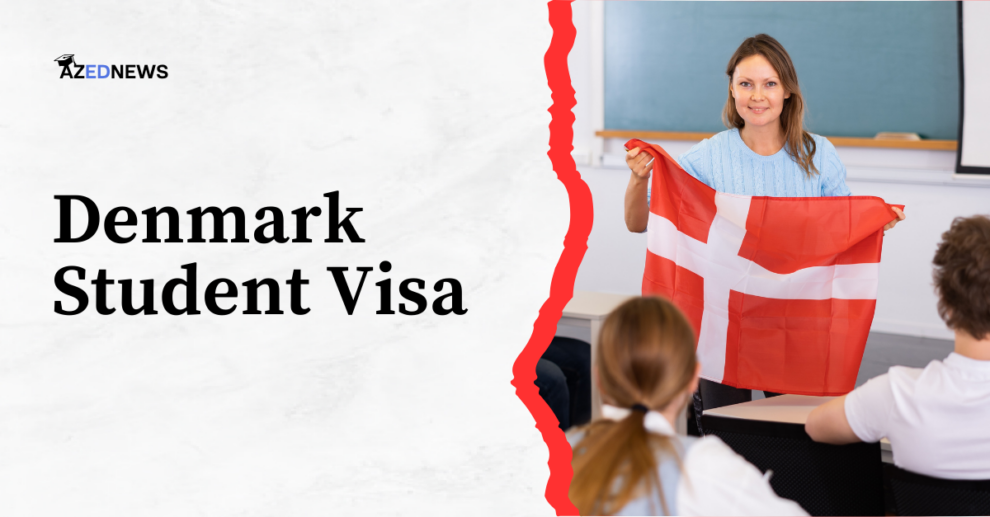Looking for Denmark Student Visa? then you have landed on right article. Danish universities have a reputation for being among the most innovative in the world, and they are eager to invest in top-notch research facilities. International students with a Danish student visa can enter the nation up to 30 days before the start of their study and remain for a maximum of two weeks after it ends.
Table of Contents
It’s an attempt to make the move easier for students who want to study elsewhere. It is essential to get knowledgeable about the nuances of the Denmark student visa application procedure if you plan to study in the country.
The purpose of this post is to give you all the information you need to start your educational adventure by giving you a thorough understanding of Denmark’s student visa requirements.
Key Takeaways:
- There are various benefits of studying in Denmark such as numerous highly regarded universities, affordable tuition fees, and excellent food.
- There are two intakes in Denmark every year. One is the summer intake and the other is the winter intake.
- Anyone who wants to study in Denmark for more than three months requires a visa except for EU, EEA, or Switzerland citizens.
- To be eligible for a Denmark Student Visa, students should meet the health requirements, should be accepted by a university, and meet the character requirements.
- The application process for a Denmark Student Visa is quite simple and requires the student to be registered in a university and pay the application fee among many others.
- Students are required to submit documents such as admission letters, completed ST1 forms, and travel insurance proof among many others during the selection process.
- Students can stay in Denmark on Student Visa for a maximum of one year.
Benefits of studying in Denmark:
Denmark is an attractive country when it comes to tourism. This country has a rich culture and heritage. Additionally, this place is also popular for providing quality education.
Students from around the globe prefer studying in Denmark since there are various top-ranked universities available here. Some benefits of studying in Denmark are:
- Attractive scholarships are available to students from abroad.
- Numerous highly regarded universities.
- Affordable tuition.
- Superior standards for schooling.
- Picturesque and scenic locations.
- It is less expensive to live.
- Fantastic Danish food.
Intakes in Denmark:
The universities in Denmark have 2 intakes every year. One is the summer intake, while the other is the winter intake.
| Intakes | Study Program | Admission Deadlines |
| Summer | Undergraduate and Postgraduate | January – Mid-March |
| Winter | Undergraduate and Postgraduate | July to September |
Do students need a visa to study in Denmark?
Anyone wishing to study in Denmark for more than three months needs a visa, except for citizens of the EU, EEA, or Switzerland. Students need to apply for the visa up to six months before the commencement of their classes at a Danish embassy or consulate overseas.
Types of Student Visa for Denmark:
| Applicant | Procedure |
| Non-EU, EEA, and Swiss citizens | Apply for a student residence permit before 6 months of arrival in Denmark |
| EU, EEA, and Swiss citizens | Apply for residence formality. Not supposed to work for a residence permit. |
Where and when to apply for a Denmark student visa?
The ideal time to begin the application process for a visa permit is three months before your intended arrival date. Because certain documents must be delivered, sealed, signed, or need biometric submission, the total processing time and timing may differ based on your country of citizenship.
For example, it will take around 60 days to process information if the applicant hails from any of the countries given below:
- India
- U.S.
- Canada
- Iran
- Indonesia
- Egypt
- Bangladesh
- Philippines
Meanwhile, applications from the countries given below have to wait for up to 6 months.
- Nigeria
- Pakistan
- Kenya
- Ghana
What are the eligibility criteria for a Denmark student visa?
There are certain eligibility criteria that applicants will have to fulfill if they want to apply for a student visa in Denmark. Some of the major criteria are:
- Must have confirmed admission to a university in Denmark:
- To enroll in the course, applicants need to apply to the college or university.
- They must have the required documentation proving their admission, and it must be verified.
- Other legitimate documents, including instructional ones, have also been made accessible.
- The educational materials need to be corroborated.
- They ought to be able to provide documentation of their most recent degree.
- Additionally, certain universities might have minimum IELTS requirement for international students, which could be a prerequisite selection criterion for selection.
- Applicants must meet the health requirements:
- Students should be healthy enough to travel to Denmark.
- Students must undergo a medical test before traveling to the country and provide relevant documents of the same.
- Students should meet the character requirements:
- Students should primarily visit Denmark to study.
- Students must be well-mannered and genuinely interested in studying in Denmark.
- In addition, students must present pertinent documentary evidence in the form of a Police Clearance Certificate (PCC).
- Students should provide proof of having sufficient funds:
- Students must have enough money to pay for their stay in Denmark as well as additional costs or have access to enough money.
- Submission of a bank statement or any comparable document is required, along with supporting documentation.
- If a student has a sponsor, they must provide proof of their financial security, which should be adequate to fund their study.
- Additionally, the guarantor documents need to be authentic and turned in at the time of application.
What is the process for a Denmark student visa?
The Danish Agency for International Recruitment and Integration receives the application for a student permit (SIRI). Students must do the following actions to meet the requirements for a study visa to Denmark and acquire a student visa for the country:
1. Apply to a registered university:
Find a Danish university that offers the chosen academic program by doing some research. Send in your admissions application and watch for their reply.
2. Payment of application fee:
Students must reserve their place in the program and begin the application procedure for a study visa to Denmark as soon as they obtain an acceptance letter from the educational institution.
3. Creating a case ID:
This is the first stage in the application process for a study permit. Students must first pay SIRI the case processing cost and acquire a case order ID.
4. Compiling the required documents:
Assemble all required paperwork, such as the acceptance letter, a current passport, the receipt for the case processing fee, the results of the language proficiency exam, bank statements, evidence of housing, and a completed visa application form.
5. Complete visa application:
Students can finish the application offline or online. Students must select Application Form ST1 if they are applying online. A portion of the application must be filled out by students and their educational institutions. The educational institution will send a reference number and password as soon as the first of the two portions is finished. To proceed with completing your portion of the application, they need to utilise these facts.
6. Submit the visa application:
Students’ applications that are submitted online are submitted automatically. Apply for a visa offline by sending the necessary paperwork and the application to the Danish embassy or consulate that is closest to you.
7. Get biometrics recorded:
When applying for a residence permit, students need to have their fingerprints and facial pictures taken. It is a crucial component of the application, and if you don’t submit it, your visa application may be denied. They can get the biometrics taken at an application centre in their home country or a Danish diplomatic office if they are sending in a downloadable application form.
8. Wait for the decision:
After submitting the application and completing the above steps, students must wait for a decision from the Danish embassy or consulate.
Photo specifications for Denmark student visa:
- Two colour photos have to be submitted
- The photographs submitted should be of size 35mm x 45mm
- It has to be a coloured photograph
- The head of the applicant should be in the central position
- The photograph should be captured within the last three months.
- The background should either be solid, plain white, or grey.
- The face of the applicant should be 80% visible.
- The applicant’s expression has to be neutral.
- Headgears are allowed only for religious reasons.
- Facial hair is allowed.
After arriving in Denmark:
One of the first things you have to do when you arrive in Denmark with your student visa is register your Danish address with the local municipality where you will be living.
You will be assigned a personal registration number or a Danish CPR number upon registering your residence. You should get in touch with your university’s student services if you have any questions about the procedure.
What are the documents required for the Denmark student visa process?
To be granted a Danish study permit, students need to provide all of the necessary paperwork. Their application is likely to be denied if anything is missing or fabricated. Some of the documents that have to be submitted are:
- A formal letter of admission from the university
- A detailed breakdown of the academic program from the university.
- A valid passport and passport-size photographs.
- A completed ST1 form
- Proof of proficiency in English or Danish language.
- Evidence that there are financial resources to live in Denmark.
- Details of living arrangements, accommodation, etc.
- Receipts of application fee payments.
- Proof of travel insurance.
How long can students stay in Denmark with a student visa?
As long as they are actively involved in their educational program, students are allowed to remain in Denmark for the whole of it. They will need to apply for a permit extension if they don’t finish the program in the allotted time.
A maximum of one year can be added to their permit extension. Their permit may be extended for a maximum of two years if they need to extend their studies because of pregnancy or parental leave.
Can a student work in Denmark with a student visa?
Depending on your home country and the season, you may be able to work a certain number of hours as an international student in Denmark.
You can work up to 20 hours per week between September and May if you’re not from the EU, EEA, or Switzerland, and 37 hours per week in June, July, and August. You won’t need to apply for a separate work permit because these permits are already provided to you by your residence visa.
Citizens of the EU, EEA, and Switzerland are free to work as much as they choose to complement their education throughout the year.
Extending Denmark student visa:
Students can apply for a Denmark student visa if:
- There has been a delay in studies.
- The students were granted a shortened permit because of passport expiration.
Students may stay in Denmark and carry on with their studies and employment while SIRI processes their application for an extension if they apply for one promptly.
They must request an extension of four months or more before the expiration of their study permit. To be eligible for an extension, you must:
- Students must continue to be enrolled in the higher education program
- Applicants must be an active student.
- Applicants should be able to support themselves financially.
What is the validity of a Denmark student visa?
A five-year student visa to Denmark is granted. If an extension is required, it can also be granted from the home country. International students can take an airport or seaport to Denmark from any selected immigration checkpoint port.
What is the cost of a Denmark student visa?
The cost of a student visa to Denmark is between DKK 1900 and DKK 2500. According to the government’s terms and conditions, the visa fee is subject to change. Students can use the immigration portal to check the details and apply for visas.
Processing time for Denmark student visa:
Generally, the processing of your application takes 60 days or two months. Therefore, it’s advisable to give yourself plenty of time to accommodate this.
However, depending on your country, processing periods may take longer. Students from Nigeria, Pakistan, Kenya, and Ghana, for example, might have to wait up to six months.
What to do if an application for a residence permit is rejected?
Even though it can be discouraging to have your application rejected, there are things you can do to rekindle your enthusiasm for studying abroad.
After you receive your letter of rejection, you have eight weeks to file an appeal with the Immigration Appeals Board. While there isn’t a set format for appeals, your email or letter must contain the following:
- Your full name
- Nationality
- Case number
- Date of the refusal
- Copy of your rejection letter
Your nationality will determine the precise sum that you must pay for your appeal. You can request that your case be reopened if you would prefer not to use the official appeals process but you have fresh information you would like the authorities to take into account.
If not, you have the option to submit a completely new application at any time.
Top university in Denmark for International students:
| University | QS World University Ranking 2024 |
| University of Copenhagen (KU) | 82 |
| Technical University of Denmark (DTU) | 104 |
| Aarhus University | 161 |
| Aalborg University (AAU) | 330 |
| University of Southern Denmark (SDU) | 347 |
| Copenhagen Business School (CBS) | 94 |
| Roskilde University (RUC) | 201 |
What is the fee structure of Denmark Universities?
The tuition price is one of the main benefits of studying in Denmark. The annual tuition fee typically falls between 7,000 and 20,000 euros. The cost schedule differs for each university. The cost of tuition varies based on the college and course you choose.
Denmark has grown in popularity as a study-abroad destination because of its reasonable tuition costs. Certain Danish colleges also offer programs that waive tuition fees. Switzerland, EEA, and EA students are eligible for free tuition at numerous public universities across the nation.
Scholarships for international students in Denmark:
| Name of Scholarship | Amount in Euro |
| Erasmus Mundus Scholarships | 12,000 |
| Nordplus Scholarship | 24,000 |
| Danish Government Scholarship (Ministry of Higher Education and Science) | 9,800 |
| CBS International Ph.D. In Economics | 51,985 |
| Danish State Tuition Fee Waivers and Scholarships at Roskilde University | 93,600 |
| The Lendo Scholarship | 60,000 |
Frequently Asked Questions:
1. How do I get a student visa for Denmark?
– Use the SIRI website to create a case order ID.
– Cover the cost of your visa application.
– Assemble the necessary paperwork.
– Fill out the application completely.
– Send in your visa application.
– At a Danish diplomatic mission, register your biometric information.
– Get a response.
2. Is IELTS required in Denmark?
Certain IELTS scores are needed in Denmark, depending on whether you want to immigrate, work, or study there. For studies, an IELTS score in the range of 6.0 to 7.0 is normally required by Danish institutions.
3. What is the success rate of student visas in Denmark?
If an overseas student applies for a master’s degree, their chances of receiving a residence visa in Denmark are very high—more than 95%. On the other hand, the likelihood of receiving a Danish study visa for those pursuing a bachelor’s degree is essentially zero.
4. How can I get PR in Denmark after studying?
You need to have a work contract or an admissions letter from your university. You have to have spent more than eight years residing in Denmark. Throughout your visit, you have to be able to sustain yourself financially. The conditions of your present residency permit still need to be met.
5. Is it difficult to get a Denmark visa?
In actuality, the complexity of obtaining a Denmark visa varies depending on several variables, such as the applicant’s unique situation, compliance with the regulations, and the particular kind of visa desired. Like many other nations, Denmark offers a thorough and open visa application procedure.
Conclusion:
After completing an advanced education program in Denmark, you may be eligible for a six-month residency permit, which you can use to hunt for employment. After completing your studies, you can find employment in Denmark during the job-seeking time. During this time, you will need to apply for a new work permit and residence permit if you receive a job offer.
Overall, the Denmark student visa application process is quite simple compared to that of other countries. This is another reason why multiple international students prefer studying in Denmark over other countries.












Add Comment